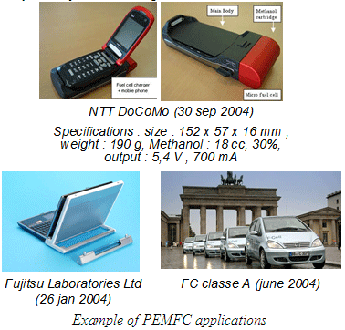The Future of Fuel Cells.
Fuel cells are often perceived as being part of the future solution to the 'energy crisis', providing 'clean' electricity with virtually no emissions. The development of fuel cells is considered to be an integral part of a sustainable "hydrogen economy".
 Fuel cells are often perceived as being part of the future solution to the 'energy crisis', providing 'clean' electricity with virtually no emissions. The development of fuel cells is considered to be an integral part of a sustainable 'hydrogen economy', in which hydrogen gas is produced using renewable sources of energy, and which offers the possibility of abundant energy with negligible emissions. Another advantage of fuel cells lies in the high efficiency for converting chemical energy into electricity and heat (hot water).
Fuel cells are often perceived as being part of the future solution to the 'energy crisis', providing 'clean' electricity with virtually no emissions. The development of fuel cells is considered to be an integral part of a sustainable 'hydrogen economy', in which hydrogen gas is produced using renewable sources of energy, and which offers the possibility of abundant energy with negligible emissions. Another advantage of fuel cells lies in the high efficiency for converting chemical energy into electricity and heat (hot water).
Currently, one kind of fuel cell is expected to be attractive for many applications: the Proton Exchange Membrane Fuel Cell (PEMFC, or more generally, Solid Polymer Fuel Cell SPFC which includes Direct Methanol Fuel Cell -DMFC-, Direct Ethanol Fuel Cell -DEFC-) for which efficiency strongly depends on the electrode-membrane-assembly. PEMFC systems provide an order of magnitude higher power density than any other fuel cell systems, and are very promising for mass market applications such as automotive and stationary small scale "combined heat and power" applications. Such power sources are being seriously considered for use in portable power source for laptop computers and cellular phones, for transportation such as buses, cars, and for stationary applications like auxiliary power sources for domestic use in housing possibly in conjunction with gas turbines.

The PEMFC can operate on reformed hydrocarbon fuels, with pre-treatment, and on air. The use of a solid polymer electrolyte eliminates the corrosion and safety concerns associated with liquid electrolyte fuel cells. Its low operating temperature of 90°C provides instant start-up and requires no thermal shielding to protect personnel. New materials and new related synthesis processes are required to improve fuel cell efficiencies and costs.
A way to increase fuel cell efficiency and to reduce costs is to improve the electrode characteristics. In particular, a reduction of the amount of noble metal catalyst (typically platinum) and in the way it is distributed in the gas diffusion electrodes would be of great value. Various solutions are being explored: new techniques for elaborating these electrodes as plasma, colloid chemistry. On the future the use of non-platinum catalysts would be necessary due to the low amount around the world. The electrolyte membrane is also subjected to active research to improve proton conductivities, low methanol crossover with low costs compared to commercial Nafion® polymers.
-
12/12/12
Peak Oil is Nonsense Because Theres Enough Gas to Last 250 Years.
-
05/09/12
Threat of Population Surge to "10 Billion" Espoused in London Theatre.
-
05/09/12
Current Commentary: Energy from Nuclear Fusion Realities, Prospects and Fantasies?
-
04/05/12
The Oil Industry's Deceitful Promise of American Energy Independence
-
14/02/12
Shaky Foundations for Offshore Wind Farms







 Read more
Read more